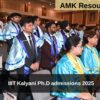University Grants Commission (UGC) has released National Higher Education Qualifications Framework (NHEQF)
The National Higher Education Qualifications Framework (NHEQF) envisages increased flexibility and choice of courses of study by students, particularly at the undergraduate level. A wide choice of subjects and courses, from year to year, will be the new distinguishing feature of undergraduate education. Students who wish to change one or more of the opted courses within the programmes of study that they are pursuing may do so at the beginning of each year, as long as they are able to demonstrate the required prerequisites and the capability to attain the defined learning outcomes after going through the chosen programme and courses of study
A National Qualifications Framework (NQF) is an instrument for the classification of qualifications according to a set of criteria for specified levels of learning achieved, which would integrate and coordinate the qualifications from each education and training sector into a single comprehensive qualification framework
The National Higher Education Qualifications Framework (NHEQF) is an instrument for the development, classification, and recognition of qualifications along a continuum of levels from 4.5 to 8, with levels 1 to 4 in school education. Each level is structured based on the defined learning outcomes,
The fundamental premise underlying the National Higher Education Qualifications Framework (NHEQF) is that higher education qualifications such as a certificate, diploma, and degree are awarded based on the demonstrated achievement of learning outcomes and academic standards expected of graduates of a programme of study
National Higher Education Qualifications Framework (NHEQF) incorporates the qualifications from each education and training sector, including Technical and Vocational Education and Training (TVET) and professional and technical education programmes (except those relating to medical education and legal education), into a single comprehensive qualifications framework, for more details CLICK HERE
